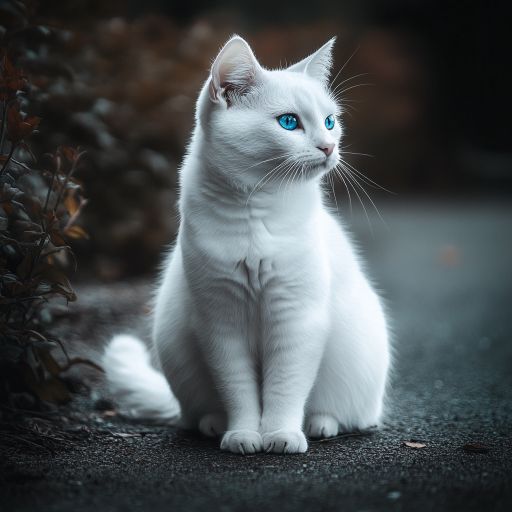Struggle with a Turkish Van Cat
Many have been enchanted by the striking looks and playful demeanor of a Turkish Van cat, only to discover that living with one can present its own set of challenges. If you find yourself in a bit of a pickle with your Turkish Van feline friend, fear not! Here are five common reasons why you might be struggling with your furry companion.

Table of Contents
The Turkish Van Cat: A Distinctive and Demanding Breed
Turkish Van cats, with their stunning white coats and striking colored tails, are truly a sight to behold. Struggle with a Turkish Van Cat. These elegant felines, hailing from the Lake Van region of Turkey, possess a unique blend of intelligence, independence, and a love for water – a trait that sets them apart from most other domestic cats.
Enchanting Personalities and Unique Traits
Turkish Van cats are known for their captivating personalities. They are playful, intelligent, and highly social. They bond strongly with their owners and often display a playful and affectionate nature. Struggle with a Turkish Van Cat. Their intelligence allows them to learn tricks and games, making them engaging and entertaining companions.
One of the most remarkable traits of the Turkish Van is its love for water. Unlike most felines, these cats revel in swimming, splashing, and even diving. This aquatic inclination is a distinct characteristic that often surprises and delights owners.

Potential Challenges for Owners
While their captivating personalities and unusual traits can make them fascinating companions, owning a Turkish Van cat comes with a set of challenges that potential owners should be well aware of.
- Independent Nature: Turkish Van cats are known for their independence. They may not always crave constant attention and may prefer to spend time alone or exploring their surroundings. This can be a challenge for potential owners who desire a more cuddly and affectionate companion.
- Demanding Behavior: These cats are intelligent and can be quite demanding. They may require significant mental stimulation and enrichment to prevent boredom and destructive behavior. Puzzle toys, interactive play sessions, and engaging activities are essential for keeping them entertained and happy.
- Water Enthusiasm: While their love for water can be endearing, it can also be messy and potentially inconvenient. Owners will need to be prepared for potential water spills and ensure that their homes are equipped with appropriate surfaces and drainage to accommodate their aquatic antics.
Is a Turkish Van Cat Right for You?
If you are considering welcoming a Turkish Van cat into your home, it is crucial to understand the potential struggles you might encounter. Struggle with a Turkish Van Cat. These cats require a dedicated and experienced owner who can cater to their specific needs and provide a stimulating environment. They are not the ideal choice for first-time cat owners or those who prefer a less demanding feline companion.
However, for those who appreciate their unique personality, intelligence, and love for water, the Turkish Van cat can be a truly rewarding and unforgettable companion. Struggle with a Turkish Van Cat. Their striking beauty, playful nature, and independent spirit will undoubtedly bring joy and amusement to any household willing to embrace their quirks and challenges.
The Vocal Athlete: Prepare for a Talkative Companion
Turkish Van cats are renowned for their chattiness. Unlike the stereotypical quiet demeanor of most felines, Turkish Vans express themselves through an impressive repertoire of meows, chirps, trills, and even yodels. Struggle with a Turkish Van Cat. While their vocalizations can be charming and even humorous at times, their tendency to be quite talkative can be overwhelming or even disruptive for some owners.
If you live in a quiet apartment or have a low tolerance for feline chatter, a Turkish Van might not be the ideal choice. Struggle with a Turkish Van Cat. However, if you enjoy with a talkative and expressive pet, you’ll find the Turkish Van’s communicative nature endearing.
The Water Enthusiast: Embrace Their Inner Mariner
As mentioned earlier, Turkish Vans are renowned for their love of water. Struggle with a Turkish Van Cat. Unlike most cats who avoid getting wet at all costs, Turkish Vans actively seek out water, enjoying splashing around in pools, bathtubs, and even running water in the sink. Their playful antics can be entertaining, but their water enthusiasm can also present challenges.
Be prepared to deal with wet floors, curious dips in your morning coffee, and a cat who might try to join you in the shower. Struggle with a Turkish Van Cat. While their aqua-loving antics can be challenging at times, they’re undeniably endearing and often provide amusement. Remember, with their playful nature, it might be difficult to deter them from their watery escapades.
The Independent Thinker: Expect a Stubborn Streak
Turkish Van cats embody independence. Struggle with a Turkish Van Cat. Unlike some breeds that crave constant attention and cuddles, Turkish Vans prefer to do things on their own terms. While they can be loving and affectionate at times, their independence can make them more challenging to train than other cat breeds.
Don’t expect blind obedience or immediate responsiveness from a Turkish Van. Instead, prepare for an intelligent feline partner with a mind of their own. Struggle with a Turkish Van Cat. Positive reinforcement training methods and plenty of patience will be key in building a bond and establishing desired behaviors. Their intelligence can be quite remarkable when properly engaged.
The High-Energy Athlete: Ensure a Stimulating Environment
The Turkish Van cat is a living embodiment of athleticism and boundless energy. Their sleek physique, powerful muscles, and natural agility make them a sight to behold, especially when they’re engaged in their favorite pastime: scaling incredible heights and leaping with astonishing grace. Struggle with a Turkish Van Cat. These energetic felines thrive on physical and mental stimulation, making them both entertaining companions and a potential challenge for their owners.
Understanding the inherent needs of a Turkish Van is crucial for ensuring their well-being and preventing unwanted behaviors. Their high energy levels demand regular playtime, not just your average run-of-the-mill chase after a feather toy. Struggle with a Turkish Van Cat. These intelligent creatures need engaging activities that challenge their minds and bodies, pushing them to utilize their natural athleticism. Puzzle toys that require problem-solving skills, interactive games that involve chasing laser pointers or chasing robotic mice, and climbing structures that mimic their natural habitat are all essential elements of a stimulating environment for a Turkish Van.
However, be warned: a bored Turkish Van is a destructive Turkish Van. Their intelligence and curiosity, coupled with their boundless energy, can lead to unwanted behaviors if they don’t feel sufficiently stimulated. Struggle with a Turkish Van Cat. Furniture bearing the brunt of their climbing instincts, shredded curtains dangling from their playful attacks, and a general sense of chaos can become the norm if you fail to provide the necessary outlet for their high energy.
Therefore, it’s crucial to be proactive in meeting your Turkish Van’s needs for physical and mental stimulation. Engage them in regular playtime sessions, invest in sturdy cat trees that can withstand their acrobatics, and rotate a variety of engaging toys to keep their minds sharp. Struggle with a Turkish Van Cat. Remember, a tired cat is a well-behaved cat, and a happy cat is one that has all its needs met.
Here are some specific tips for providing a stimulating environment for your Turkish Van:
Interactive Playtime:
- Feather wands and laser pointers: These classics never fail to pique a Turkish Van’s interest. Just be sure to vary the movements and provide periods of rest to avoid overstimulation.
- Interactive toys: Puzzle feeders, treat dispensers, and electronic toys that move or make sounds can provide hours of fun and mental stimulation.
- Hide-and-seek: This simple game can be surprisingly engaging for a Turkish Van. Hide yourself or a toy, then call your cat’s name and watch them excitedly search for you.
Climbing Structures:
- Tall cat trees: Invest in a cat tree that is sturdy enough to withstand your Turkish Van’s energetic climbs. Look for one that has multiple levels, scratching posts, and perches for them to explore and rest on.
- Wall-mounted shelves: These can provide additional climbing space and scratching opportunities for your high-energy feline.
- DIY climbing structures: Get creative and build your own cat tree using sturdy materials like wood or PVC pipes.
Enriching Toys:
- Puzzle toys: These come in various shapes and difficulty levels, challenging your cat to figure out how to access the hidden treats inside.
- Treat balls: These dispense treats as your cat bats them around, providing both physical and mental stimulation.
- Catnip toys: Many Turkish Vans are highly responsive to catnip, making catnip-filled toys an irresistible source of fun and relaxation.
By providing a stimulating environment that caters to their athleticism and intelligence, you can ensure that your Turkish Van thrives and becomes a well-rounded, happy, and well-behaved companion. Struggle with a Turkish Van Cat. Remember, a little effort goes a long way in preventing unwanted behaviors and fostering a strong bond with your energetic feline friend.
The Sensitive Soul: Provide a Nurturing Environment
Turkish Van cats are remarkably sensitive to their human companions’ emotions and require a nurturing, understanding environment. They bond deeply with their family members and thrive on positive attention and gentle interactions. Struggle with a Turkish Van Cat. Their emotional sensitivity makes them ideal companions for individuals who appreciate their intuitive nature.
However, their sensitivity also means they can be easily startled by loud noises, abrupt movements, or stressful situations. Struggle with a Turkish Van Cat. Respecting their delicate nature, providing a calm and predictable environment, and offering reassurance through gentle words and soothing gestures are crucial in nurturing a harmonious bond with a Turkish Van. Recognizing and catering to their sensitivity will reward you with a truly devoted and emotionally connected friend.
Unfamiliarity with the Breed
Lack of Research
Before bringing a Turkish Van cat into your home, it’s important to do your research. Struggle with a Turkish Van Cat. Lack of knowledge about this unique breed can lead to misunderstandings and challenges in caring for them. Turkish Vans are known for their love of water, high energy levels, and their independent nature. Without understanding these characteristics, you may find yourself unprepared for the specific needs of a Turkish Van.
Unrealistic Expectations
For those unfamiliar with Turkish Van cats, unrealistic expectations can often arise. Struggle with a Turkish Van Cat. You might expect a Turkish Van to be a lap cat that enjoys cuddling all day, but in reality, they are known to be more active and playful. It’s imperative to recognize and appreciate the breed’s individual traits and not expect them to conform to a stereotypical cat behavior. By adjusting your expectations and understanding the breed’s unique qualities, you can create a more harmonious relationship with your Turkish Van.
Grooming Challenges
Some Turkish Van cats have specific grooming needs that may pose challenges for you as an owner. Struggle with a Turkish Van Cat. Their beautiful semi-longhaired coats require regular maintenance to keep them healthy and looking their best. Here are some grooming challenges you might encounter with your Turkish Van cat.
Thick Coat Maintenance
On top of their playful and mischievous nature, Turkish Van cats have thick, water-resistant coats that can mat if not properly groomed. Struggle with a Turkish Van Cat. Regular brushing is necessary to prevent tangles and mats from forming. You may find that your cat requires more frequent grooming sessions compared to shorthaired breeds.
Shedding Struggles
Shedding is another common grooming challenge faced by Turkish Van cat owners. These cats have a double coat that sheds seasonally, which means you can expect a significant increase in hair around your home during shedding periods. Struggle with a Turkish Van Cat. This can be particularly challenging if you or a family member have allergies to pet dander.
For instance, you may need to invest in a high-quality pet hair vacuum cleaner to keep your home clean during shedding seasons. Struggle with a Turkish Van Cat. Regular grooming with a deshedding tool can also help minimize the amount of loose hair your Turkish Van cat sheds.
Energetic Demands
High Energy Levels
The Turkish Van cat is known for its high energy levels, which can sometimes be overwhelming for owners who are not prepared for their energetic nature. Struggle with a Turkish Van Cat. You may find yourself struggling to keep up with the constant need for play and stimulation that your Turkish Van craves.
Exercise Requirements
Requirements for exercise are imperative when it comes to caring for a Turkish Van cat. You need to provide ample opportunities for your cat to burn off energy through playtime and interactive toys. Struggle with a Turkish Van Cat. If you do not meet their exercise needs, your Turkish Van may become bored and resort to destructive behaviors around your home.
A tired Turkish Van is a happy Turkish Van, so make sure you are providing enough playtime and activities to keep them entertained and engaged. Struggle with a Turkish Van Cat. Engaging your cat in play sessions regularly will not only help them stay physically healthy but will also strengthen your bond with your furry friend.

Affection and Attention Needs
Not giving your Turkish Van cat the affection and attention they crave can lead to behavioral struggles. Struggle with a Turkish Van Cat. These unique kitties are known for their love of human companionship and can suffer if they feel neglected.
Velcro Cat Syndrome
An affectionate breed, Turkish Van cats can develop a “Velcro Cat Syndrome” if they don’t receive enough attention from you. Struggle with a Turkish Van Cat. They may become overly attached and demand constant cuddles and petting.
Separation Anxiety
With their strong bonds to their owners, Turkish Van cats are prone to separation anxiety when left alone for extended periods. This can manifest in destructive behavior, excessive meowing, or even depression.
It is important to ensure your Turkish Van cat has enough mental stimulation and companionship to prevent separation anxiety. Providing interactive toys, leaving on soothing music, or even considering getting another pet for company can help ease their distress.
Training Difficulties
Independent Nature
All Turkish Van cats have a bit of an independent streak. They are known for being intelligent and resourceful, which can sometimes make them a bit resistant to training. You might find that your Turkish Van prefers to do things their own way rather than following your commands. This independent nature can make training a bit challenging, but with patience and consistency, you can still make progress.
Stubbornness
One of the reasons you might struggle with training your Turkish Van cat is their stubbornness. These cats are known for being quite strong-willed, and once they have made up their mind about something, it can be tough to change it. You might find that your Turkish Van is reluctant to learn new tricks or follow commands, which can be frustrating. However, by using positive reinforcement techniques and being persistent, you can overcome their stubbornness and make training more successful.
The key to dealing with their stubbornness is to remember that Turkish Van cats respond best to positive reinforcement. Punishments or yelling will only make them more resistant to training. Instead, try using treats and praise to reward good behavior and encourage them to listen to you.
To effectively train your Turkish Van cat, you will need to be patient and consistent. These cats thrive on routine, so try to establish a regular training schedule and stick to it. By being patient, using positive reinforcement, and staying consistent, you can overcome their training difficulties and build a strong bond with your Turkish Van cat.
Health Concerns
Hypertrophic Cardiomyopathy
Keep an eye out for potential health concerns with your Turkish Van cat, such as Hypertrophic Cardiomyopathy, a condition where the heart muscle becomes abnormally thick. This can lead to issues with the heart’s pumping function and may result in symptoms like difficulty breathing, lethargy, or even sudden collapse.
Patellar Luxation
The patella, or kneecap, can sometimes luxate or dislocate in Turkish Van cats, causing discomfort and lameness. You might notice your cat favoring a leg or having trouble moving around. If your cat shows signs of patellar luxation, it’s necessary to consult your vet for proper diagnosis and treatment.
The patellar luxation in Turkish Van cats is often genetic, so if you’re considering bringing one into your home, inquire about the cat’s family history and potential predisposition to this condition.
Final Words
Drawing together the various reasons you might struggle with a Turkish Van cat, it’s important to remember that every feline companion comes with their own unique set of challenges and quirks. While their independent nature and high energy levels can be overwhelming at times, with patience, understanding, and proper care, you can develop a strong bond with your Turkish Van cat.
Bear in mind, every cat is an individual, and what works for one may not work for another. By taking the time to learn about your cat’s breed-specific characteristics and catering to their needs, you can create a happy and harmonious environment for both you and your Turkish Van cat. So, embrace the challenges, enjoy the affection and playfulness, and remember that a little patience can go a long way in building a strong and loving relationship with your furry friend.



